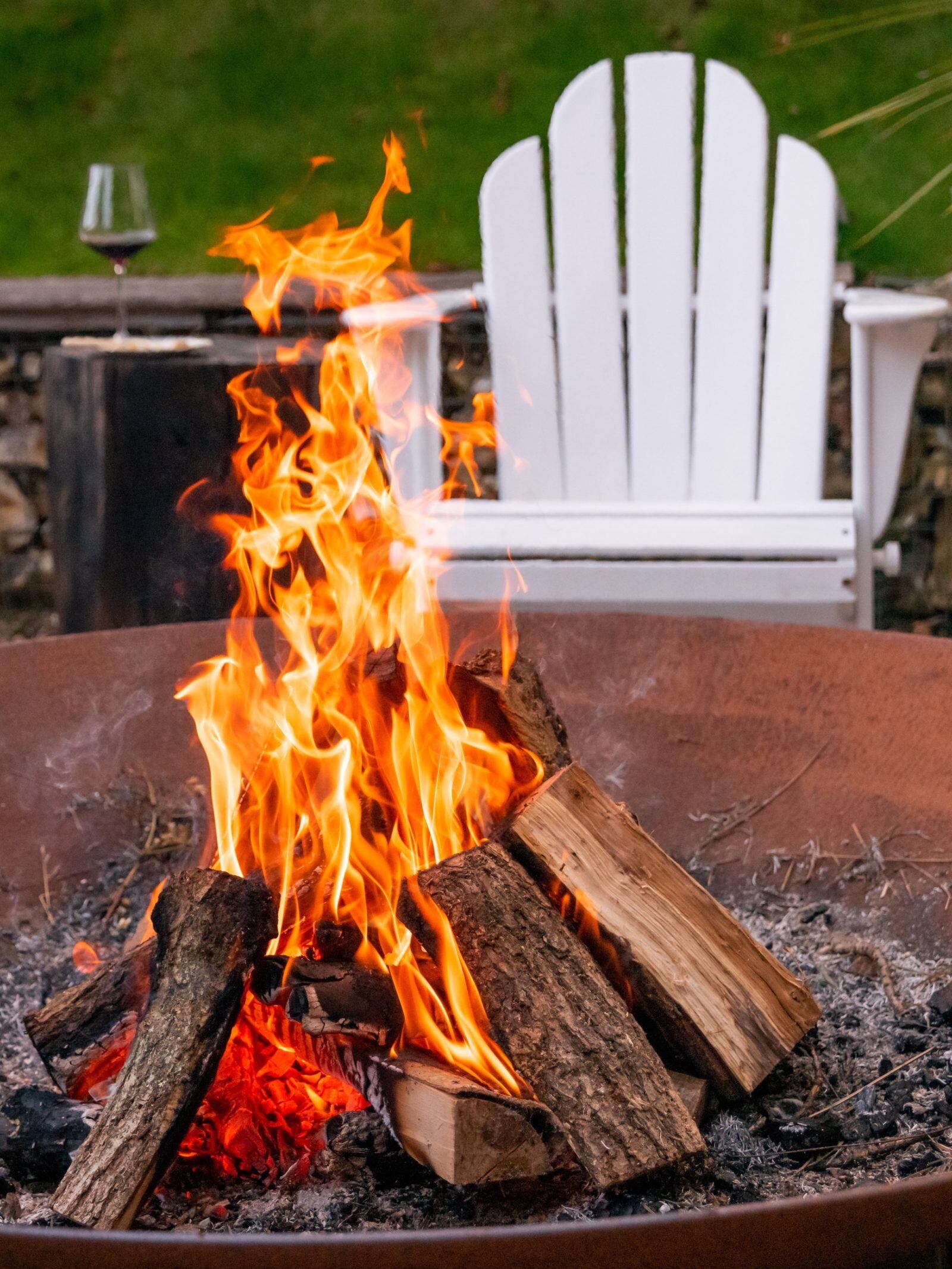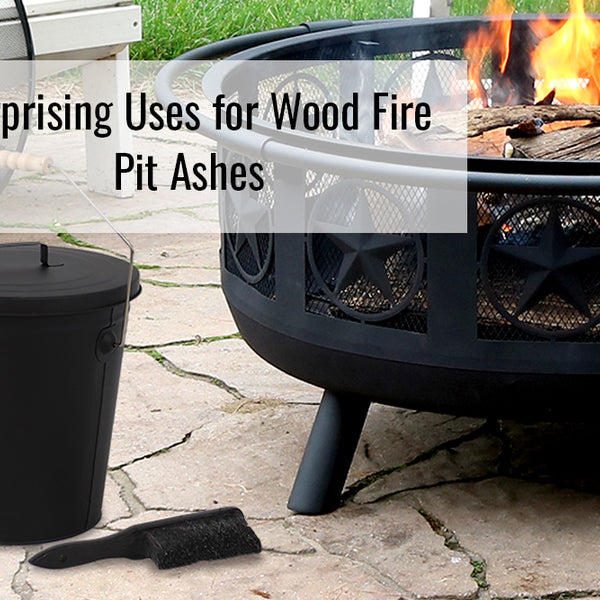To properly dispose of ashes from a fire pit, let the ashes cool completely, then scatter them in the garden to enrich the soil or add them to your compost pile for added nutrients. Fire pit ashes can also be used to melt ice, repel pests, and even hide stains on pavement.
By repurposing ashes in a safe and environmentally friendly way, you can benefit your garden and outdoor space while reducing waste. Remember to always handle ashes with care and avoid disposing of them in areas where they can be a fire hazard.

Credit: www.fenceanddeckconnection.com
Creative Uses For Fire Pit Ashes
Fire pit ashes can be repurposed in creative ways beyond just disposing of them. Discover how these versatile ashes can find new life with these innovative ideas:
Improve Soil Quality
If you desire healthier soil, utilizing fire pit ashes can be a game-changer. By properly applying ashes onto your garden, you can nurture your plants and enhance the soil’s nutrient content.
Create Natural Pest Repellent
Fire pit ashes can serve as a natural deterrent for pests in your garden. Scatter the ashes strategically to ward off unwanted visitors while avoiding harmful chemicals.
Enhance Traction On Icy Surfaces
Wood ash from your fire pit can act as a natural de-icer and traction enhancer on slippery surfaces during winter. Sprinkle ashes on icy pathways to improve grip and safety.

Credit: www.bobvila.com
Practical Tips For Handling Fire Pit Ashes
After extinguishing the fire, let the ashes cool for 24 hours before removing. Use a metal shovel to transfer ashes to a metal container. Avoid mixing ashes with trash and only dispose in designated areas. Ashes can be used as a soil amendment for certain plants, but avoid using near acid-loving plants.
Safely Dispose Of Fireplace Ashes
Safely discard: When disposing of fireplace ashes, make sure they are cool before disposal to prevent accidental fires. Properly secure the lid of the ash container to avoid ash particles from dispersing.
Cleaning And Maintaining The Fire Pit
Regular cleaning: Remove ash after every use to prevent the buildup of soot and debris that may impede airflow.
Potential Effects On Plants And Soil
When considering what to do with ashes from a fire pit, it’s crucial to understand the potential effects on plants and soil. The use of wood ash can have both positive and negative impacts, and it is important to be mindful of these effects when deciding how to manage and dispose of fire pit ashes.
Impact On Grass And Lawn
Wood ash from a fire pit can have positive effects on your grass and lawn. When applied correctly, it can help improve soil quality by neutralizing pH levels and providing essential nutrients like potassium. These nutrients can contribute to the overall health and vitality of your grass and surrounding soil, creating a more favorable environment for plant growth.
Plants That Don’t Like Wood Ash
Certain plants are sensitive to wood ash and may not thrive in its presence. These include apple, peach, and pear trees, sweet corn, peppers, eggplant, rhubarb, parsley, sweet potatoes, potatoes (which can lead to scab), blueberries, raspberries, most other berries, roses, azaleas, rhododendron, hydrangea, birch trees, red maples, and pin oaks.
“` In this blog post section, we highlighted the potential effects of fire pit ashes on plants and soil and focused specifically on the impacts on grass and lawn as well as the plants that don’t favor wood ash. The content includes clear and concise HTML syntax, ensuring readability and SEO optimization.Innovative Household Applications
Enhance your home compost with a sprinkle of wood ashes from your fire pit. Wood ash can improve soil quality, boost pH levels, and provide essential nutrients for your grass to thrive. Additionally, wood ash can be used as a traction enhancer on icy surfaces or as a natural pest repellent.
Add Ash To Your Home Compost
One innovative way to repurpose ashes from your fire pit is to add them to your home compost. Simply sprinkle a small amount of wood ashes into your outdoor compost pile or indoor compost bin. The ashes can act as a valuable component, adding essential nutrients to the composting process.
Using Ash As A Cleaning Agent
Another innovative use for fire pit ashes is as a natural cleaning agent. Wood ashes have abrasive properties that make them perfect for removing stubborn stains on surfaces such as concrete or pavement. Simply sprinkle a small amount of ashes on the stain, rub with a cloth or brush, and rinse with water.
Repelling Pests And Hiding Stains
In addition to being an effective cleaning agent, wood ashes can also serve as a natural pest repellent. Sprinkle a thin layer of ashes around plants or areas where pests are commonly found to deter them from invading your space.
Furthermore, if you have stains on concrete or pavement that you want to hide, wood ash can act as a natural camouflage. Simply sprinkle ash over the stain and lightly brush it into the surface for a temporary solution.
Enhancing Traction And De-skunking
If you’re dealing with icy or snow-covered surfaces, wood ashes can be used to enhance traction. Spread a thin layer of ashes over the affected areas to improve grip and reduce slipping hazards.
Additionally, if your furry friend has encountered a skunk and is in need of deodorizing, wood ashes can help neutralize the odor. Rub a handful of ashes into your pet’s fur, allowing the ashes to absorb the skunk odor, then brush them out.
Overall, the ashes from your fire pit can be incredibly versatile when it comes to innovative household applications. From composting and cleaning to repelling pests and enhancing traction, don’t miss out on the potential of this often overlooked resource.
Community And Environmental Considerations
After using a fire pit, consider beneficially recycling the ashes into your lawn for enhancing soil quality. Ashes help balance pH levels and provide nutrients like potassium, fostering the growth of healthy grass and soil. Proper disposal of fire pit ashes safeguards the environment and soil health.
Proper Ash Disposal
When it comes to the ash from your fire pit, it is important to consider proper disposal methods to protect the community and the environment. Simply throwing the ashes in the trash may seem like an easy solution, but it can have negative consequences. Instead, follow these guidelines for proper ash disposal: 1. Allow the ashes to cool completely before handling or disposing of them. 2. Use a metal container with a tight-fitting lid to store the ashes. 3. Avoid using plastic bags or containers, as hot ashes can melt through them. 4. Double-check that the ashes are completely cold and no longer emitting any heat before disposing of them.Impact On Garden Beds And Outdoor Spaces
While fire pit ashes can have benefits for your garden, it’s important to understand their potential impact on garden beds and outdoor spaces. Here are a few key considerations: 1. Soil pH: Fire pit ashes have alkaline properties, which can raise the pH levels of the soil. Some plants prefer acidic soil, so it’s important to be mindful of the plants in your garden and their pH requirements. 2. Nutrient Content: Ashes can contain trace elements and nutrients beneficial to plants, such as potassium. However, excessive application of ashes can lead to nutrient imbalances, so it’s crucial not to overuse them. 3. Salt Content: Fire pit ashes may contain residual salt, which can be harmful to some plants and impact soil health. It’s essential to avoid using ashes near sensitive plants or in areas where runoff may affect nearby water sources. To minimize the potential negative effects of fire pit ashes on your garden, follow these recommendations: – Test the soil pH regularly to monitor any changes caused by the application of ashes. – Apply ashes sparingly and avoid concentrated areas to prevent nutrient imbalances. – Consider alternative sources of organic matter and fertilizer to maintain a healthy garden. Remember, always consult gardening experts or extension offices for specific guidance tailored to your local environment and plants. By taking these community and environmental considerations into account, you can make informed decisions on what to do with the ashes from your fire pit while ensuring the well-being of your garden and outdoor spaces.
Credit: sunnydazedecor.com
Frequently Asked Questions On What To Do With Ashes From Fire Pit
Are Fire Pit Ashes Good For The Lawn?
Fire pit ashes are good for the lawn as they improve soil quality and boost grass health. Ashes neutralize pH levels and provide essential nutrients for the soil and grass to thrive.
Where Is The Best Place To Dump Fireplace Ashes?
After extinguishing the fire, let the fireplace ashes cool for at least 24 hours before disposal. The best place to dump fireplace ashes is in a metal container with a tight-fitting lid. Avoid placing ashes directly in the trash or near any flammable materials.
Should You Clean Ashes Out Of Fire Pit?
To maintain the efficiency of your fire pit, it’s important to clean out ashes and debris regularly. Excessive ash buildup can impede airflow and affect the performance of your fire pit.
What Plants Don’t Like Wood Ash?
Certain plants that don’t like wood ash include apple, peach, and pear trees, sweet corn, potatoes, blueberries, roses, and birch trees.
Faq 1: Can I Use Fire Pit Ashes To Improve My Lawn?
Fire pit ashes can improve your lawn’s soil quality by neutralizing pH levels and providing valuable nutrients like potassium.
Conclusion
Fire pit ashes can provide many benefits for your lawn and garden. By properly applying ashes, you can improve soil quality and boost the health of your grass and surrounding plants. Additionally, you can use ashes for composting and even as a natural pest repellent.
Consider the valuable uses of fire pit ashes to enhance your outdoor space.